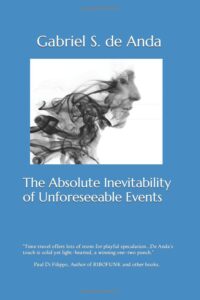The Absolute Inevitability of Unforeseeable Events

In a nebulous future, the Metaversal Epiphytic Spaciotemporal Atlas --- MESA, or just “the Atlas” --- has the monopoly on time travel. In the wake of a series of temporal fiascos, the Atlas declares time travel illegal. In reaction, time-hopping belligerents challenge the Atlas’ hypocritical and manipulative oligopoly, setting up a rival time traveler’s underground. They are referred to as the Kronokaze.
In “1969”, Ricky Cervantes, an innocent high school teenager with an inferiority complex finds himself the focus of unwanted attention. An old elementary school nemesis is stalking him. His childhood friend Andre Grijalva, suffering from Methuselah Syndrome, is trying to watch his back. But there’s a new girl in school, the mysterious Lou Ocheltree, and she’s shaking up Ricky’s world. She wants to introduce him to Swanwick and Endriss Rivery, and she’s drawing back the curtain to show him a reality he has been wholly ignorant of. Not all of it is good.
Later, in “My Dinner with Jodorowsky”, it is 1976. After two years and two million dollars spent, Alejandro Jodorowsky, the famous director and star of “El Topo”, has been removed from the movie development of “Dune.” The Société Cartier multinational buys the movie rights to Frank Herbert’s novel with the goal of getting Jodorowsky back at the helm. A meeting is set up to woo him back, and 19-year-old Kage Caracole, a star-struck Jodorowsky fan, is one of various interpreters in attendance. In dealing with an improbable cast of characters --- Alfred Jarry, André Gregory, Antonin Artaud, and the magical and fascinating Jodorowsky himself --- Kage is confronted by charming impossibilities and a multitude of questions. Who is Swanwick Rivery, the enigmatic snark whom no one can identify, yet whom everyone is looking for? And did Kage hear correctly? Is there really a group of alleged time traveling guerillas who call themselves the Kronokaze trying to muck things up? Or is it all dinner theater?
“Few writers can create worlds so rich and fully-realized the reader immediately feels at home, even when the concepts have not yet been fully laid out.” So writes Gordon Linzner, the author of “The Spy Who Drank Blood” and founder of “Space and Time”, the longest running small press SF magazine. “Fewer still can do so with language so rich and lyrical it is a joy to read, with details so rooted in the human experience that one cannot help but be absorbed into the story. Gabriel de Anda is such a writer. Readers, you are in for a treat.”
If you wish to read an excerpt, click here.